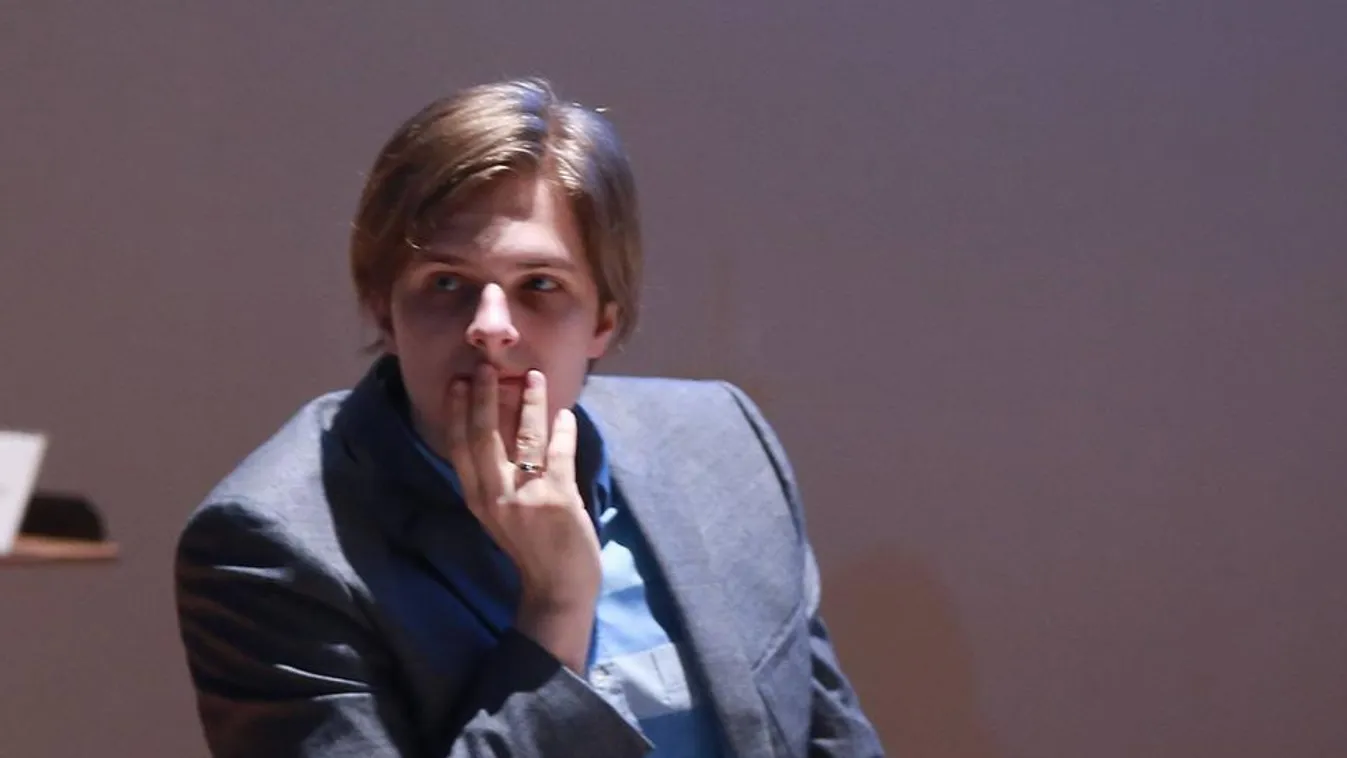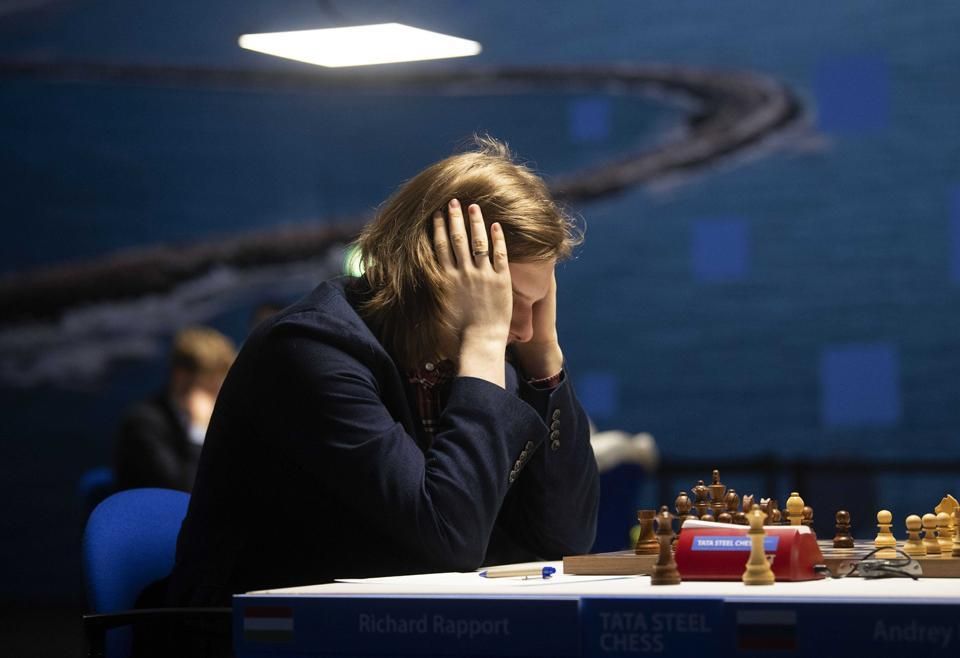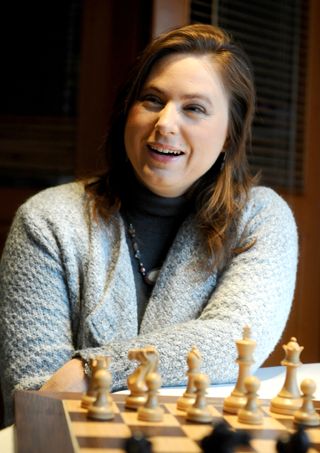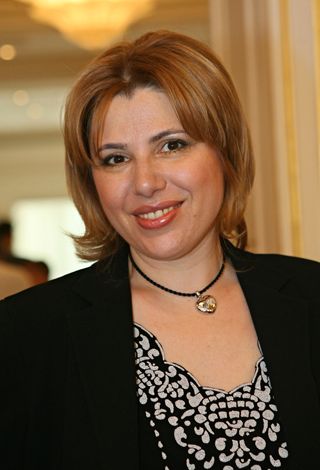Richárd Rapport: gladiator at the chessboard

| Born: March 25, 1996; Szombathely Sport: chess Title: Grandmaster (GM) Achievement: team – Chess Olympiad runner-up (2014), European Championship 3rd place (2015), U18 bronze (2010); Individual – European champion (2015, team competition, second board), Hungarian champion (2017), U20-World Championship silver (2012), European Union Chess Championship gold (2006, U10), rapid chess European champion (2013). Major tournament wins: Malmö (2013), Neckar Open (2013), Malta (2015), London (2016), Villorba (2018), Danzhou (2019), Belgrade (2022) Awards: Junior Prima Prize (2010), Hungarian Chess Player of the Year (2015, 2017, 2019, 2020, 2021) |
Do you remember the movie Gladiator? Russell Crowe, who plays Maximus, picks up a small piece of soil before major battles, examines it, wanders and prepares for the fights that await him. Well, Richárd Rapport, referring to the film, explained why he usually spends a lot of time on his first one or two steps that seem needless. "It's a strange habit, but I do it to tune in to the game," he said in an interview after the first Grand Prix in Berlin. By the way, when it comes to movies, he mentions Matrix and Casablanca (!) as his favorite ones.But how did the still-only-26-year-old chess player, who grew up in the village of Sé near his birthplace, Szombathely, has been the best Hungarian grandmaster for many years, and become such a tough, fearless chess player? He had to fight many battles, and sometimes triumph was not lost either. Now he's a world champion candidate, winning the most important challenge of his life so far.
WITH THE SPEED OF CARLSEN ON THE LADDER
The story is known to death: he was very good at math, but he once got a B. It wasn't the grade that was the tragedy (quite a lot of us would accept it without thinking, wouldn't we?), but rather his carelessness as he didn't realize there were more math problems on the other side of the paper, too. What is the best remedy for a concentration "disease?" Well, chess!
The method worked, but Richárd Rapport improved too quickly in the game to keep it just a focus-enhancing pastime. Because his level of knowledge rose rapidly, and it is no exaggeration that he raced along with the speed of Carlsen on the ladder. At the age of eight, the Norwegian player was a novice, but he became an international grandmaster five years later. When Rapport was 10, his rating was 1998 in January 2007, and in May 2010, it was at 2509, which means that his Elo point has increased by more than 500 in over three years. It's an awesome pace. At the age of 13, in the summer of 2009, he obtained the International Master title, and only six months later did he become an international Grandmaster... at the age of 13 years, 11 months and 6 days. According to the all-time ranking position at the time, he obtained the grandmaster title as the fifth youngest. On the international level, he is now overtaken by many, but he is the youngest player to this day to ever reach the highest rank in Hungary.
He was more advanced than his peers in many ways. Ágota Lénárt, a sports psychologist, found at the time that he was five to six years ahead of his age group in terms of intelligence, and his behavior was considered more mature.
NOT ONLY TALENT THAT MATTERS
Professional goals were written on plain sheets of paper on his bedroom wall so that he would never lose sight of them. One of the great favorites of his childhood was Mikhail Tal, who, although he was world champion for only one year, had a huge impact on chess history with his combinatorial, sometimes overly reckless style and this influence is still felt today. In addition, Richárd Rapport raised the bar of the Soviet (Latvian) legend because he often drives his opponents crazy with his opening. He utilizes the classic lineups, but he can always pull out something that might surprise the opponent, to say the least. Talent, dedication, willpower, perseverance, all these were there in Richárd Rapport. "My style of play says I might lose the match, but I still don't give up on that. I'm risking as much for success now as I used to before," Richárd said when he was 17.

He did not neglect his physical preparation either. He regularly attended Haladás' wrestling hall, the division of Olympic bronze medalist Gábor Hatos. It was certain that the ring wouldn't pull him away from the chess table, but it helped with his fitness. He also did/does gym training (a separate room was also set up in the house in Sé), and he also got a taste of table tennis and cycling.
However, it should not be forgotten for a moment that the love for the game and talent are not enough to become a world-class grandmaster. This journey also involves a long period of financial strain, and this cannot be done without parents and supporters. A significant promotional company (Felix Promotion) or a renowned entrepreneur became his sponsor even without knowing him. From the age of 17, he was able to use Docler Holding's server room, making the computer part of his preparation much more efficient. But he could always rely on his family the most. There were some difficult moments, but he continued to compete because of his love for chess. His perseverance paid off as he was able to rise to the top of the best.

Wijk aan Zee holds a special place in chess history. There have been and there are other major venues such as Linares in Spain, or Monaco, where the best of the chess world gathered together from time to time, but none of them have survived as long and at such a high level as the tournament of a small town in the Netherlands. Perhaps Dortmund or Hastings in England are the exceptions, which also host major tournaments, but for example, the Germans always have a smaller field. On the other hand, the best players have been visiting Wijk aan Zee for over 80 years where one can make history.
Richárd Rapport finished second in Group B in 2013. It was a significant achievement, and everyone has paid more attention to him from then – world no.1 Magnus Carlsen also praised him. The Norwegian, who became the world champion that year, always has a realistic evaluation of his competitors, which is why his words were important; he saw a serious future in Rapport. So, it wasn't as much of a shock when Richárd defeated him in a fantastic game in the 2017 tournament. With a less commonly used opening, queen sacrifice, and classic Rapport style. But there was something else in this victory: it was here that he became certain he could beat anyone at any time.
NSO’s TV report from 2013
As he became more experienced year by year, so did his successes come. Tournament in Malmö, Neckar Open, gold at the European Rapid and Blitz Chess Championships, Zalakaros Chess Festival (also Hungarian champion title), super tournament in Danzhou, if we only look at his best individual results not mentioning the many other valuable ranks. This year's Grand Prix series, the victory in Belgrade and the candidate qualification are the greatest successes of his life, after which he can no longer be considered only a world-class grandmaster but also a member of the narrowest elite.
In terms of his knowledge, he has always been among the best. Previously, his performance was not so consistent (sometimes his Elo point went up above 2750, then it fell back below 2700). In recent times, however, he has been playing much more balanced chess. He can make the most out of him, thanks to which he moves up the world rankings, where – at the moment of writing this article – he is already positioned 6th with 2776 points.
THE HUNGARIAN NATIONAL TEAM
Richárd Rapport was able to participate in the Chess Olympiad for the first time in 2014, so in Tromsø, he was also a member of the super team, one of the strongest Hungarian national teams of all time (Péter Lékó, Judit Polgár, Zoltán Almási, Richárd Rapport, Csaba Balogh) that reached the silver medal. "Ricsi is only 18 years old and has huge energy reserves," said Tamás Horváth, the head coach at the time. "This was his first Olympiad, and I had to support him because he didn't start well. I think he will catch up with Péter Lékó sooner or later because he has so much knowledge and momentum in him."
He did; time proved the coach.
Unfortunately, he does not play for the national team these days, but rather focuses on individual appearances. It is another matter that the chronic problem of Hungarian chess is that the federation often cannot agree with the best players and their participation. The issue is both professional and financial. Either way, it hurts that in most cases the national team does not travel to the current world competition with the strongest squad. The silver of Tromsø also showed that if all the best players sit at the chess board and they just have to focus on the game, then Hungarian chess players can do anything.

THE WIFE'S WORD
The best female chess player of all time, Judit Polgár, still has a great influence on him to this day, and they often talk to each other. At the same time, as he puts it, he does not really have a permanent professional helper these days, he relies mostly on himself, and his wife also gives advice.
What? Does the wife have a say?
She can because she's not just anyone. Jovana Vojinović, now Jovana Rapport, is the top player on the Serbian women's national team. She is four years older, and Richárd listens to her so much that he played her proposed opening in one of the games against Maxime Vachier-Lagrave at the GP tournament in Belgrade. They currently live in Belgrade.
At the same time, he began to place much less emphasis on public appearances. He does not give interviews very much – he prefers analyzing his current party after rounds of tournaments, and he rarely opens up more deeply. He is also present on social media, but rather keeps low, and primarily uses Twitter.
| "We worked together from July 2009 to December 2010, and at the beginning of the cooperation, he had an Elo score of 2401. During this period, he became the youngest Hungarian grandmaster of all time, winning nearly 140 Elo points in three quarters of a year. Later, from November 2012 to June 2014, we worked together again, when the starting Elo score was 2621, and we ended the collaboration with 2701. Professionally, this was perhaps an even more exciting time as Ricsi worked with fantastic chess players such as Shirov, Fressinet, Jobava, and the tournament organizers gave him many opportunities for his tie result in Group B at the 2013 Wijk aan Zee tournament. I believe that the degree of efficiency of the professional work and the wide network of contacts were added values that ensured a very rapid development in addition to his outstanding talent. In June 2014, unfortunately, because of trust deficit, I had to terminate our cooperation once again and now permanently. After our professional cooperation, there were ups and downs for years on both occasions, but him maturing also had a very positive effect on his chess game, so even it happened several years later, he earned a spot in the narrow elite of the world, and he is constantly invited to the biggest tournaments. In my opinion, he has wasted at least four years and based on his abilities, he should have been part of the elite for years. A successful chess career requires a number of factors that were not given, it was also suggested to me that he would not be actively playing chess, but luckily this did not happen. Richárd Rapport is a fantastic talent, for whom professionals had high hopes from a very young age. His talent is unmatched, but he has been hampered by a number of other factors in his ability to reach the Parnassus of the chess world. My opinion is that he could have reached the top 10 much earlier, but his career included a lot of detours, bad decisions and wasted time. It is also regrettable that he has an increasingly weaker attachment to Hungary, so it is feared that a larger chess nation will take him under its wings as this is a popular attitude in the world. At the same time, we see a more serious but still brilliant chess player whose life experience is clearly reflected in his game and continues to defeat weaker players at an extremely high ratio, and clearly, his still-unpredictable-but-no-longer-chaotic style is feared by the best as well for a reason. There is also a noticeable improvement in the opening theory preparation compared to the previous period, and the famous killer instinct also appears against the weaker players. If he prepares professionally for the Candidates Tournament and creates a team and helpers are him who are indispensable for such a competition, then I am definitely looking forward to seeing him in the top flight based on his balanced form. He has to detach himself from the pressures felt in similar tournaments, he needs to be psychologically prepared, and focus on playing the best chess possible – in this case, a good result will not be missed, for which I wish him good luck from here!" |
THE CANDIDATES' TOURNAMENT
This year, the aforementioned good fitness was of particular importance. In January, Wijk aan Zee (2nd and 3rd place!) followed by the Grand Prix tournament in Berlin (semifinals) and Belgrade (victory). In about two months, he played 31 classic games, meaning that, on average, he sat at a table every other day and concentrated for hours. It was stressful, but he did it. No wonder sleeping is one of his favorite activities on his day off. The reward for his efforts was the greatest success of his career.
The Candidates Tournament in the summer will feature an incredibly tough field in Madrid. The last tournament finalist, Ian Nepomniachtchi of Russia, Teimour Radjabov of Azerbaijan as a candidate for FIDE, Jan-Krzysztof Duda of Poland, who won the 2021 World Cup, and 18-year-old Frenchman Alireza Firouzja, who is 3rd in the world rankings, American Fabiano Caruana, who also reached the World Cup finals, American Hikaru Nakamura, who won this year's Grand Prix series, and most likely Ding Liren, the world No.2 Chinese are all going to participate, and Richárd Rapport has to compete against them.
He's going to need all his knowledge...
(Translated by: Vanda Orosz)
